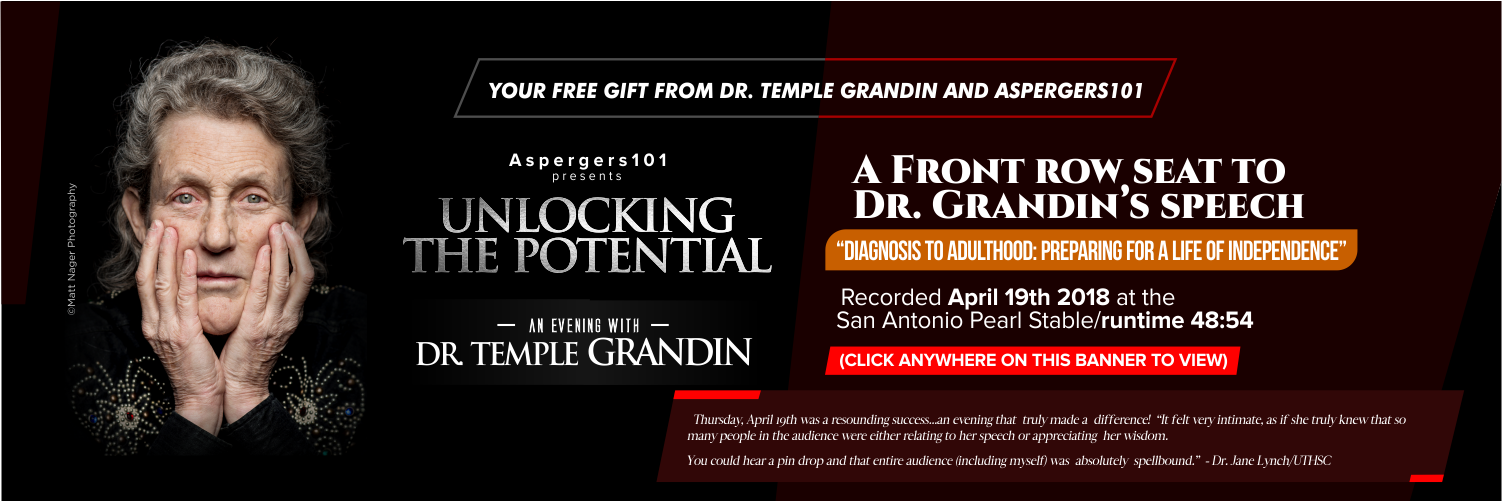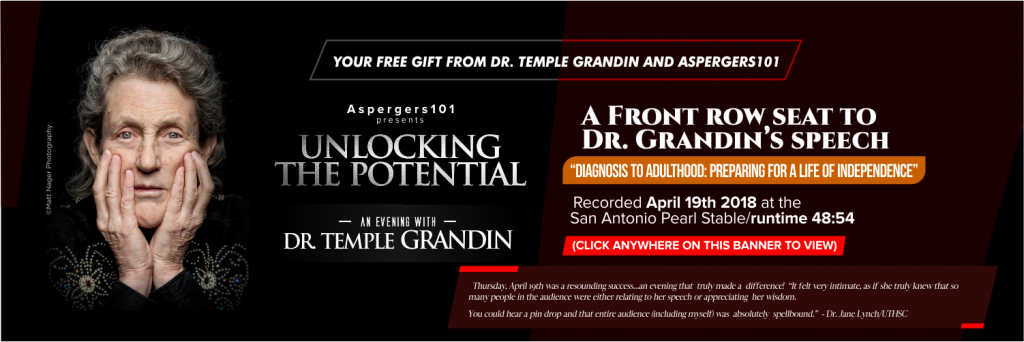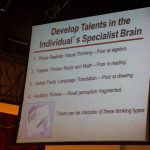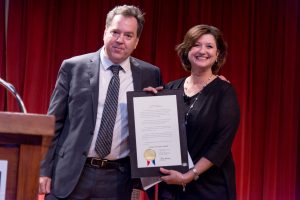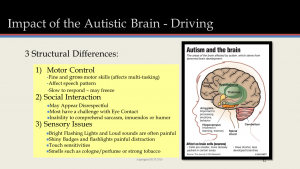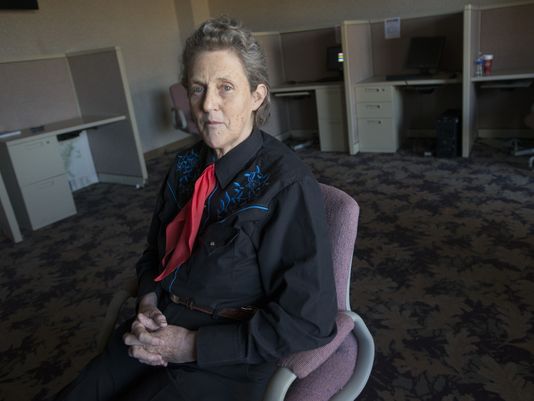Temple Grandin Explains: Choosing the Right Job for People with ASD
Jobs need to be chosen that make use of the strengths of people with Autism or Asperger’s syndrome. Both high and low functioning people have very poor short-term working memory, but they often have a better long-term memory than most neurotypicals. I have great difficulty with tasks that put high demands on short-term working memory. I cannot handle multiple tasks at the same time.

Table 1 is a list of BAD jobs that I would have great difficulty doing.
Table 2 is a list of easy jobs for a visual thinker like me.
I have difficulty doing abstract math such as algebra and most of the jobs on Table 2 do not require complex math. Many of the visual thinking jobs would also be good for people with dyslexia.
The visual thinking jobs on Table 2 put very little demand on fast processing of information in short-term working memory. They would fully utilize my visual thinking and large long-term memory. Table 3 is a list of jobs that non-visual thinkers who are good with numbers, facts and music could do easily.
They also put low demands on short-term working memory and utilize an excellent long-term memory. Table 4 shows jobs that lower functioning people with autism could do well. For all types of autism and Asperger’s syndrome, demands on short-term working memory must be kept low. If I were a computer, I would have a huge hard drive that could hold 10 times as much information as an ordinary computer but my processor chip would be small.
To use 1999 computer terminology, I have a 1000 gigabyte hard drive and a little 286 processor. Neurotypicals may have only 10 gigabytes of disc space on their hard drive and a Pentium for a processor. I cannot do two or three things at once.
Some job tips for people with Autism or Asperger’s syndrome:
- Jobs should have a well-defined goal or endpoint.
- Sell your work, not your personality. Make a portfolio of your work.
- The boss must recognize your social limitations.
It is important that high functioning autistics and Asperger’s syndrome people pick a college major in an area where they can get jobs. Computer science is a good choice because it is very likely that many of the best programmers have either Asperger’s syndrome or some of its traits. Other good majors are: accounting, engineering, library science, and art with an emphasis on commercial art and drafting. One could major in library science with a minor in history, but the library science degree makes it easier to get a good job.
Some individuals, while they are still in high school, should be encouraged to take courses at a local college in drafting, computer programming or commercial art. This will help keep them motivated and serve as a refuge from teasing.
Families with low income may be wondering how they can afford computers for their child to learn programming or computer aided drafting. Used computers can often be obtained for free or at a very low cost when a business or an engineering company upgrades their equipment.
Many people do not realize that there are many usable older computers sitting in storerooms at schools, banks, factories and other businesses. It will not be the latest new thing, but it is more than adequate for a student to learn on.
In conclusion: a person with Asperger’s syndrome or autism has to compensate for poor social skills by making themselves so good in a specialized field that people will be willing to “buy” their skill even though social skills are poor.
This is why making a portfolio of your work is so important. You need to learn a few social survival skills, but you will make friends at work by sharing your shared interest with the other people who work in your specialty. My social life is almost all work related. I am friends with people I do interesting work with.
Table 1
Bad Jobs for People with High Functioning Autism or Asperger’s Syndrome: Jobs that require high demands on short-term working memory
- Cashier — making change quickly puts too much demand on short-term working memory
- Short order cook — Have to keep track of many orders and cook many different things at the same time
- Waitress — Especially difficult if have to keep track of many different tables
- Casino dealer — Too many things to keep track of
- Taxi dispatcher — Too many things to keep track of
- Taking oral dictation — Difficult due to auditory processing problems
- Airline ticket agent — Deal with angry people when flights are cancelled
- Future market trader — Totally impossible
- Air traffic controller — Information overload and stress
- Receptionist and telephone operator — Would have problems when the switch board got busy
Table 2
Good Jobs for Visual Thinkers
- Computer programming — Wide-open field with many jobs available especially in industrial automation, software design, business computers, communications and network systems
- Drafting — Engineering drawings and computer aided drafting. This job can offer many opportunities. Drafting is an excellent portal of entry for many interesting technical jobs. I know people who started out at a company doing drafting and then moved into designing and laying out entire factories. To become really skilled at drafting, one needs to learn how to draw by hand first. I have observed that most of the people who draw beautiful drawings on a computer learned to draw by hand first. People who never learn to draw by hand first tend to leave important details out of their drawings.
- Commercial art — Advertising and magazine layout can be done as freelance work
- Photography — Still and video, TV cameraman can be done as freelance work
- Equipment designing — Many industries, often a person starts as a draftsman and then moves into designing factory equipment
- Animal trainer or veterinary technician — Dog obedience trainer, behavior problem consultant
- Automobile mechanic — Can visualize how the entire car works
- Computer-troubleshooter and repair — Can visualize problems in computers and networks
- Small appliance and lawnmower repair — Can make a nice local business
- Handcrafts of many different types such as wood carving, jewelry making, ceramics, etc.
- Laboratory technician — Who modifies and builds specialized lab equipment
- Web page design — Find a good niche market can be done as freelance work
- Building trades — Carpenter or welder. These jobs make good use of visual skills but some people will not be able to do them well due to motor and coordination problems.
- Video game designer — Stay out of this field. Jobs are scarce and the field is overcrowded. There are many more jobs in industrial, communications business and software design computer programming. Another bad thing about this job is exposure to violent images.
- Computer animation — Visual thinkers would be very good at this field, but there is more competition in this field than in business or industrial computer programming. Businesses are recruiting immigrants from overseas because there is a shortage of good programmers in business and industrial fields.
- Building maintenance — Fixes broken pipes, windows and other things in an apartment complex, hotel or office building
- Factory maintenance — Repairs and fixes factory equipment
Table 3
Good Jobs for Non-Visual Thinkers: Those who are good at math, music or facts
- Accounting — Get very good in a specialized field such as income taxes
- Library science — reference librarian. Help people find information in the library or on the Internet.
- Computer programming — Less visual types can be done as freelance work
- Engineering — Electrical, electronic and chemical engineering
- Journalist — Very accurate facts, can be done as freelance
- Copy editor — Corrects manuscripts. Many people freelance for larger publishers
- Taxi driver — Knows where every street is
- Inventory control — Keeps track of merchandise stocked in a store
- Tuning pianos and other musical instruments, can be done as freelance work
- Laboratory technician — Running laboratory equipment
- Bank Teller — Very accurate money counting, much less demand on short-term working memory than a busy cashier who mostly makes change quickly
- Clerk and filing jobs — knows where every file is
- Telemarketing — Get to repeat the same thing over and over, selling on the telephone. Noisy environment may be a problem. Telephone sales avoids many social problems.
- Statistician — Work in many different fields such as research, census bureau, industrial quality control, U.S. Dept. of Agriculture, etc.
- Physicist or mathematician — There are very few jobs in these fields. Only the very brilliant can get and keep jobs. Jobs are much more plentiful in computer programming and accounting.
Table 4
Good Jobs for Nonverbal People with Autism or People with Poor Verbal Skills
- Reshelving library books — Can memorize the entire numbering system and shelf locations
- Factory assembly work — Especially if the environment is quiet
- Copy shop — Running photocopies. Printing jobs should be lined up by somebody else
- Janitor jobs — Cleaning floors, toilets, windows and offices
- Restocking shelves — In many types of stores
- Recycling plant — Sorting jobs
- Warehouse — Loading trucks, stacking boxes
- Lawn and garden work — Mowing lawns and landscaping work
- Data entry — If the person has fine motor problems, this would be a bad job
- Fast food restaurant — Cleaning and cooking jobs with little demand on short-term memory
- Plant care — Water plants in a large office building
Temple Grandin, Ph.D.
Assistant Professor
Colorado State University
Fort Collins, CO 80523, USA
(November, 1999)
This article was written in 1999 by the Assistant Professor at Colorado State University Dr. Temple Grandin. It is still very relevant today as it applies to job seekers who are on the autism spectrum. As published at: Indiana Institute on Disability and Community
A graduate of Abilene Christian University, Jennifer had a long career in TV Broadcasting. Upon learning her oldest son Sam had a form of Autism called Asperger’s Syndrome, she left her career and became a full-time mother to both of her sons. Jennifer elicited the participation of her family and together they produced several independent programs including a children’s animated series titled Ameriquest Kids, as well as a documentary and book titled, Coping to Excelling: Solutions for School-age Children Diagnosed with High-Functioning Autism or Aspergers Syndrome. She formed the nonprofit Asperger101 to provide on-going free resources related to ASD at Aspergers101.com and has implemented the Texas Driving with Disability Program and continues to grow the statewide initiative today. She and her husband have recently retired to their property in the Texas Hill Country.





